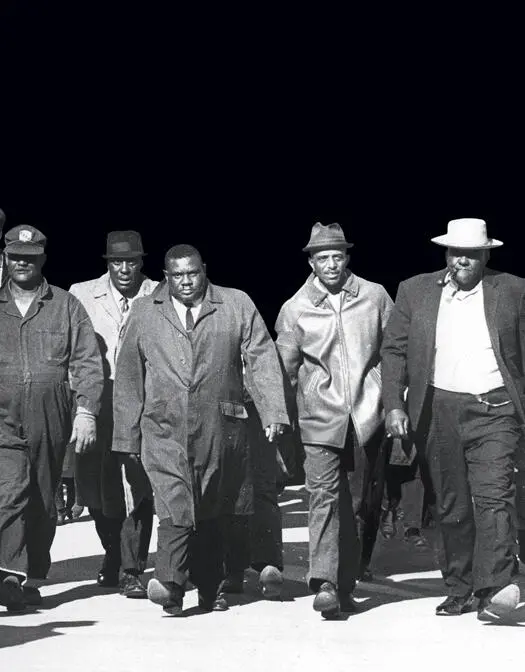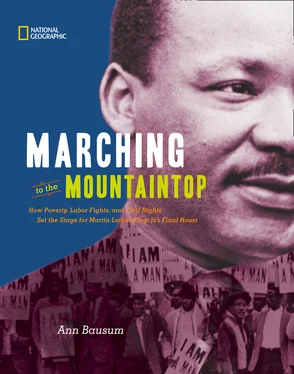“WE’VE got to stay together in the union to win the victory. Strength is in numbers. We must stay together for however long is necessary—a day, a week, a month.”
P. J. Ciampa, AFSCME field director, addressing workers on February 13, 1968
The first mass march occurred the afternoon of Tuesday, February 13, day two of the strike. T. O. Jones and Bill Lucy led a formation of more than 800 workers, walking in rows of four or five men, from their union meeting place in north Memphis to downtown. They clapped, cheered, and sang freedom songs as they marched a distance of about five miles to city hall. “The men are here,” Lucy told the mayor. “You said, ‘Any men you want to bring down to talk to me, I’ll talk to them.’ Here they are.” At first Loeb misunderstood the size of Lucy’s group and asked him to escort the men into the mayor’s office. Soon he corrected himself and met workers in a large assembly hall.
Loeb’s so-called plantation-mentality approach backfired when he spoke to the workers as if they were children—humoring, scolding, and pressuring them to return to work. To the mayor’s shock, the men laughed at him.
Strike organizers credited Henry Loeb (above, at desk, during early negotiations) with becoming their best ally because his attitudes and behavior united blacks (below, marching on February 23) in their opposition to the city.
They clapped, cheered, and sang freedom songs as they marched a distance of about five miles to city hall. “The men are here,” Lucy told the mayor. “You said, ‘Any men you want to bring down to talk to me, I’ll talk to them.’ Here they are.”
When Loeb expressed his empathy for them by using the expression, “I’d give you the shirt off my back,” one of the men called in reply, “Just give me a decent salary, and I’ll buy my own.” The workers’ cheekiness and disrespect infuriated the mayor. Loeb vowed to get the garbage collected with or without the men’s help. “Bet on it!” he declared as he stormed out of the meeting.
Loeb was a well-educated business-owner-turned-politician. Three generations of his family had exploited black workers and amassed a fortune in the family laundry business. His father had prevented black washerwomen from organizing a union or striking for better pay by filling their jobs from the ranks of the unemployed. Employees put up with miserable wages because some job was better than no job. When Henry Loeb became public works director in the 1950s, he brought along his family business mind-set. As director he bought the cheapest of equipment, instituted the program of staff cuts on rainy days, justified unpaid overtime by offering paid vacation, and beat back every attempt to form unions. For Henry Loeb, the 1968 strike became a battle of wills—mayor against rebellious blacks. If he just held out long enough, he believed, the workers would give up. Early in the strike, Loeb told a white acquaintance and union advocate that his father “would turn over in his grave if he knew he had ever recognized a damn union,” Taylor Blair recalled. “I knew there wasn’t much point in arguing with a fellow like that because he was trying to uphold what his daddy had said.”
“THIS IS just a warning. Please don’t bring another damn truck out of that gate. Do you love your family? Please, please.”
Anonymous notesent by a strike supporter to a worker who continued to collect garbage
Loeb suspended settlement negotiations soon after his first meeting with the workers, and he announced that the city would begin replacing workers two days later. To poll the striking workers, union officials asked them to stand if they wanted to keep fighting. “They stood in unison—1,000 plus. They’re not going back,” an AFSCME official reported. By Friday Loeb had recruited replacements for only a fraction of the missing workers. Most whites dismissed garbage collection as beneath them, and only the most desperate of African Americans agreed to work against the cause of fellow blacks.
The city developed emergency rules to copewith the labor shortage. Trash collection dropped from twice to once a week. City officials instructed citizens to haul their trash to the curb. They encouraged families to include food waste in their trash—left uncollected it would encourage breeding of the city’s persistent population of rats—but to store other trash until the strike ended. Burning garbage remained illegal. Boy Scout groups volunteered to carry garbage barrels to curbs for the elderly, or even to haul trash to emergency dump sites. Others earned cash from such chores.
Members of the city council struggled to find their roles in the growing crisis. Like the mayor, they were new to their jobs and to a weeks-old governance system. The mayor insisted that he alone could negotiate on behalf of the city, and he became angry whenever council members tried to settle the strike. The ten whites on the council (including the council’s sole female member) saw little reason to challenge his authority, and the three blacks on the council lacked the political power to argue otherwise.
After the strike carried on into a second week, though, black councillor Fred Davis, chair of the city’s public works committee, offered to meet with workers to discuss their grievances. The February 22 session deteriorated after union reps recruited hundreds of workers to march on city hall and crowd the council chamber. Volunteers arrived with more than 100 loaves of bread, and wives of striking workers made bologna sandwiches for the group. Workers applauded as union reps and supportive ministers spoke forcefully on their behalf, and they refused to leave without having their demands met. Committee members struggled to construct a settlement resolution that could be presented to the full council for approval the next day. It took more than an hour to persuade T. O. Jones and the men to accept the one-day delay.
Workers stood and cheered before leaving the hall. They vowed to return on February 23 for the council vote. If all went as promised, the strike would be over the next day.

“Let’s keep marching,” urged James Lawson. “They’re trying to provoke us. Keep going,” he said.
The Methodist minister watched as a string of police cars edged closer to retreating workers. Bumper touching bumper, the cars crowded against the rows of marchers, herding them into a tighter formation. Lawson recognized the potential for conflict from his years of experience with the civil rights movement. Workers and accompanying family members needed to walk off some of their anger and disappointment over the latest city council meetings. Strikers had left city hall on February 22 anticipating a settlement of their grievances.
Конец ознакомительного фрагмента.
Текст предоставлен ООО «ЛитРес».
Прочитайте эту книгу целиком, купив полную легальную версию на ЛитРес.
Безопасно оплатить книгу можно банковской картой Visa, MasterCard, Maestro, со счета мобильного телефона, с платежного терминала, в салоне МТС или Связной, через PayPal, WebMoney, Яндекс.Деньги, QIWI Кошелек, бонусными картами или другим удобным Вам способом.












